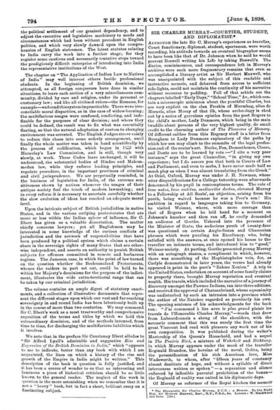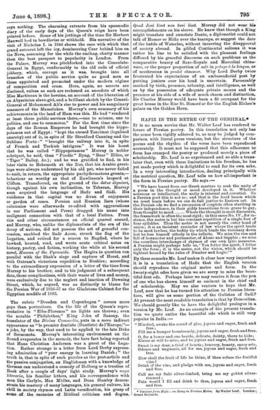SIR CHARLES MURRAY—COURTIER, STUDENT, AND DIPLOMATIST.* ALTHOUGH the late Sir
C. Murray's experiences as traveller, Court functionary, diplomat, student, sportsman, were worth recording, his attitude towards an eventual biographer seems to have been like that of Dr. Johnson when he said he would prevent Boswell writing his Life by taking Boswell's. The diaries, reminiscences, and correspondence left in Murray's archives were such mere fragmentary remains that even so accomplished a literary artist as Sir Herbert Maxwell, who was unacquainted with the subject of this readable and instructive memoir, and debarred from access to sufficient side-lights, could not maintain the continuity of his narrative without recourse to padding. Full of that article are the chapters labelled "Early Days," "School Time," &c., which con- tain a microscopic minimum about the youthful Charles, but are very explicit on the clan Freskin of Murmhag, alias de Moravia, alias Moray of that ilk, whose archmology is eked out by a series of garrulous epistles from the poet Rogers to the child's mother, Lady Dunmore, which being in the main twaddle about persons of the very highest quality, do small credit to the charming author of The Pleasures of Memory. Of different calibre from this Regency stuff is a letter from Brougham to Lady Dunmore explanatory of the paths by which her son may climb to the summits of the legal profes- sion and of the orator's art. Burke, Fox, Demosthenes, Cicero, and Dante are to be learned by rote :—" I cite a very poor instance," says the great Chancellor, "in giving my own experience ; but I do assure you that both in Courts of Law and Parliament, and even to mobs, I have never made half so much play as when I was almost translating from the Greek." At Oriel, Oxford, Murray was under J. H. Newman, whose utter disqualifications for a College tutorship were afterwards denounced by his pupil in contemptuous terms. The rule of bene flatus, belle vest it us, ntediocriter doctus, elevated Murray to a Fellowship at All Souls', an objection, arising from his youth, being waived because he was a Peer's son ! His ambition in regard to languages taking him to Germany, he visited Weimar, where, with more courage than that of Rogers when he laid hand for a moment on Johnson's knocker and then ran off, he coolly demanded an audience of Goethe. Ushered into the presence of the Minister of State, the audacious youth of twenty-four was questioned on certain Anglo-Saxon and Chaucerian phrases which were puzzling his Excellency, who, being satisfied with the answers, at once opened his house to the traveller on intimate terms, and introduced him to "good," Weimar society. At parting, Goethe presented young Murray with an autograph stanza, a compliment in which, however, there was something of the Mephistopheles vein, for, as Carlyle demonstrated in later years, the verses had already
appeared in print in the poet's " Zahme Xenien." A trip to t he United States, undertaken on account of some family claims to property there, brought Murray reputation and eventual wealth. His travels, which included the narrative of a journey of discovery amongst the Pawnee Indians, ran into three editions, and received the approval of Chateaubriand, whose equanimity was undisturbed by such an intrusion into a province which the author of the Natchez regarded as peculiarly his own.
The opening sentence of his acknowledgments for the book ran : " J'ai commena a lire avec le plus grand plaisir les travels de l'Honorable Charles Murray,"—words that drew from Labourdonnais a shrug of the shoulders, with the sarcastic comment that this was surely the first time the great Viscount had read with pleasure any work not of his own composition. It was published during the writer's Mastership of the Queen's Household, and had a sequel in The Prairie Bird, a mixture of Wahrheit and Dichtung, in which Murray appears under the mask of the traveller Reginald Brandon, the heroine of the novel, Oolita, being the personification of his rich American love, Miss Wadsworth, to whom, after "fifteen years of constancy almost destitute of hope, and without a syllable of direct intercourse written or spoken" — a separation and silence enforced by inflexible parental prohibition of the banns— the Reginald of reality was united in his diplomatic days.
Of Murray as reformer of the Royal kitchen the memoir
• The Honourable Sir Charles Murray, K C.13. : a Memoir. By the Right Hon. Sir Hrrb,.rt Maxwell, Bart., M.P., F.B.S., &a London : W. Blackwood and Sons. [184.]
says nothing. The charming extracts from his spasmodic diary of the early days of the Queen's reign have been printed before. Some of his jottings of the time Sir Herbert Maxwell had to bowdlerise or withhold. His narrative of the visit of Nicholas I. in 1844 shows the care with which that grand autocrat left the icy, domineering Czar behind him on the Neva, assuming for the while the smiling, chatty manner then the best passport to popularity in London. From the Palace, Murray was pitchforked into the Consulate- General in Egypt, conformably to the old code of official jobbery, which, corrupt as it was, brought into all branches of the public service quite as good men as those appointed and promoted under the modern regime of competition and cram. Here, again, no secrets are disclosed, unless as such are reckoned an anecdote of which Miss Martineau is the heroine, an account of the liberation of an Abyssinian slave-girl, and a brilliant sketch by the Consul- General of Mohammed Al's rise to power and his sanguinary massacre of the Mamelakes. Murray's own summary of his achievements in the land of Ham was this. He had "rendered at least three public services there,—one to science, one to politics, and one to commerce." For the first time since the days of the Roman Emperors he had brought the hippo- potamus out of Egypt : "kept the cursed Tanzimat (legalised anarchy) out of it, in spite of Sir Stratford Canning and the Sublime Porte :" "brought the railway into it, in spite of French and Turkish intrigues." It was his boast that he was called " Hippopotamus " Murray (a nobler sobriquet, he said, than " Poodle " Byng, " Bear " Ellice, or "Tiger" Bailey, &c.); and he was gratified to find, in his later visits to Behemoth at the Zoo, that his Arabic greet- ings were always understood by his old pet, who never failed to emit, in return, the appropriate pachydermatous grunts,— behaviour as worthy as that of Rawlinson's leopard at Clifton. Transferred, on the ground of the detur digniori, though against his own inclination, to Teheran, Murray soon acquired the language of Hafiz and S'adi. His residence in that capital was no divan of enjoyment or garden of roses. Persian and Russian liars (whose calumnies were afterwards re-edited with aggravations in our Parliament and Press) dragged his name into malignant connection with that of a local Fatima. From this and other circumstances an official quarrel ensued, and Murray, who, unlike the diplomatists of the era of the decay of nations, did not possess the art of graceful con- cession, snubbed the Sadr Azem, struck the flag of the Legation, and retired for a season to Bagdad, where he hawked, hunted, read, and wrote acute critical notes on history, poetry, and fiction, working the while at his second novel, Hassan of the Pyramids. The Hegira in question ran parallel with the Shah's siege and capture of Herat, and with Outram's victorious expedition to Bushire; according to the extraordinary expression of a letter of the time from Murray to his brother, and to his judgment of a subsequent date, these complications, with their waste of lives and money, were exclusively due to the neglect and inaction of Downing Street, which, he argued, was as distinctly to blame for the Persian War of 1856-57 as the Gladstone Cabinet for the Egyptian muddle of 1883.
The rubric "Dresden and Copenhagen" covers more gaps than portraiture. On the life of the Queen's repre- sentative in "Elbe-Florence" no lights are thrown ; even the notable "Philalethes," King John of Saxony, the translator of the Divina Comnzedia, puts in a mere indirect appearance as "le premier dentists (Dantiste) de l'Europe,"— a joke, by the way, that used to be applied to the late Duke of Sermoneta. Murray's interesting environment on the Sound evaporates in the memoir, the bare fact being reported that Hans Christian Andersen was a guest of the Lega- tion. Rather strange is a letter from Lord Derby express- ing admiration of "your energy in learning Danish ; " the truth is, that in spite of such puzzles as the post-article and the passive conjugation, an Englishman with a knowledge of German can understand a comedy of Holberg or a treatise of Bask after a couple of days' light study. Murray's nugx literariz, his familiar letters, and his correspondence with men like Carlyle, Max Muller, and Dean Stanley demon- strate his mastery of many languages, his general culture, his skill in society rhymes and Latin versification, his grasp of some of the esoterics of Biblical criticism and dogma.
Quod Jovi licet von bori lice& Murray did not wear hie accomplishments on his sleeve. He knew that though a King might translate and annotate Dante, a diplomatist could not talk of Homer or Hafiz over the teacups, or suggest the date of the battle of Waterloo, without incurring the disapproval of society abroad. In gilded Continental saloons it was rather his line to be satisfied with the pleasant feelings diffused by his graceful discourse on such problems as the comparative beauty of Saxe-Royale and Marcolini china- ware, or the proper proportion of salt in potage a la bisque, or of mushrooms in poulet cha.sseur. Why Lord Derby twioe frustrated his expectations of an ambassadorial post by putting juniors over his head is uncertain. Favourably marked by birth, presence, urbanity, and intelligence, as well as by the possession of adequate private means and the presence at his side of a wife of much charm and distinction, Sir Charles Murray would have been a fit occupant for the great house in the Rue St. Honore or for the English Elchee's palace on the Golden Horn.



































 Previous page
Previous page